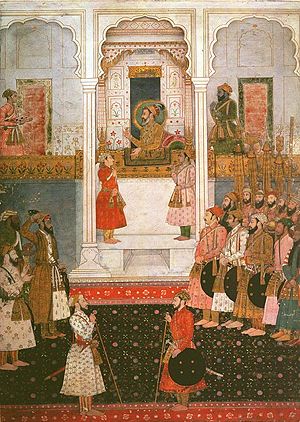Shah Jahan: Difference between revisions
Jump to navigation
Jump to search


imported>Robert W King No edit summary |
imported>Aleksander Stos m (typo) |
||
| Line 1: | Line 1: | ||
{{subpages}} | {{subpages}} | ||
[[Image:Shah Jahan.jpg|thumb|Shah Jahan, holding a [[durbar]] in the public audience hall of his palace]] | [[Image:Shah Jahan.jpg|thumb|Shah Jahan, holding a [[durbar]] in the public audience hall of his palace]] | ||
'''Shah Jahan''' (b.[[January 5]], [[1592]] – d.[[January 22]], [[1666]]) was the fifth ruler of the [[Mughal Empire]] in India from [[1628]] until [[1658]]. In common with other Mughal rulers his contemporary chroniclers | '''Shah Jahan''' (b.[[January 5]], [[1592]] – d.[[January 22]], [[1666]]) was the fifth ruler of the [[Mughal Empire]] in India from [[1628]] until [[1658]]. In common with other Mughal rulers his contemporary chroniclers referred to him under a number of different pseudonyms <ref>Al-Sultan al-'Azam wal Khaqan al-Mukarram, Abu'l-Muzaffar Shihab ud-din Muhammad, Sahib-i-Qiran-i-Sani, Shah Jahan I Padshah Ghazi Zillu'llah</ref> many of which he took to honour his ancestor [[Timur]] from whom the Mughals were decended. In 1616 he was given the title Shah Khurrum Shihab-ud-din Muhammad by his grandfather [[Akbar]]. Shah Jahan means ''Lord of the World'' and was a title bestowed upon him by his father Jahangir after Jahan's most notable military victories in his father's service in 1617.<ref>http://www.4dw.net/royalark/India4/delhi6.htm</ref> | ||
==Notes== | ==Notes== | ||
Revision as of 03:17, 7 January 2008

Shah Jahan, holding a durbar in the public audience hall of his palace
Shah Jahan (b.January 5, 1592 – d.January 22, 1666) was the fifth ruler of the Mughal Empire in India from 1628 until 1658. In common with other Mughal rulers his contemporary chroniclers referred to him under a number of different pseudonyms [1] many of which he took to honour his ancestor Timur from whom the Mughals were decended. In 1616 he was given the title Shah Khurrum Shihab-ud-din Muhammad by his grandfather Akbar. Shah Jahan means Lord of the World and was a title bestowed upon him by his father Jahangir after Jahan's most notable military victories in his father's service in 1617.[2]
Notes
- ↑ Al-Sultan al-'Azam wal Khaqan al-Mukarram, Abu'l-Muzaffar Shihab ud-din Muhammad, Sahib-i-Qiran-i-Sani, Shah Jahan I Padshah Ghazi Zillu'llah
- ↑ http://www.4dw.net/royalark/India4/delhi6.htm